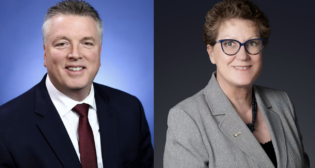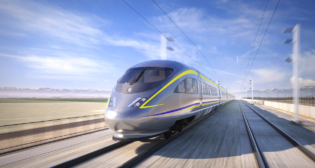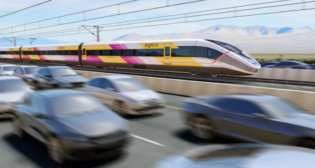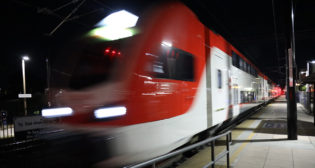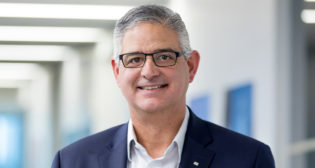
Alstom’s Montreal Milestone
Written by William C. Vantuono, Editor-in-Chief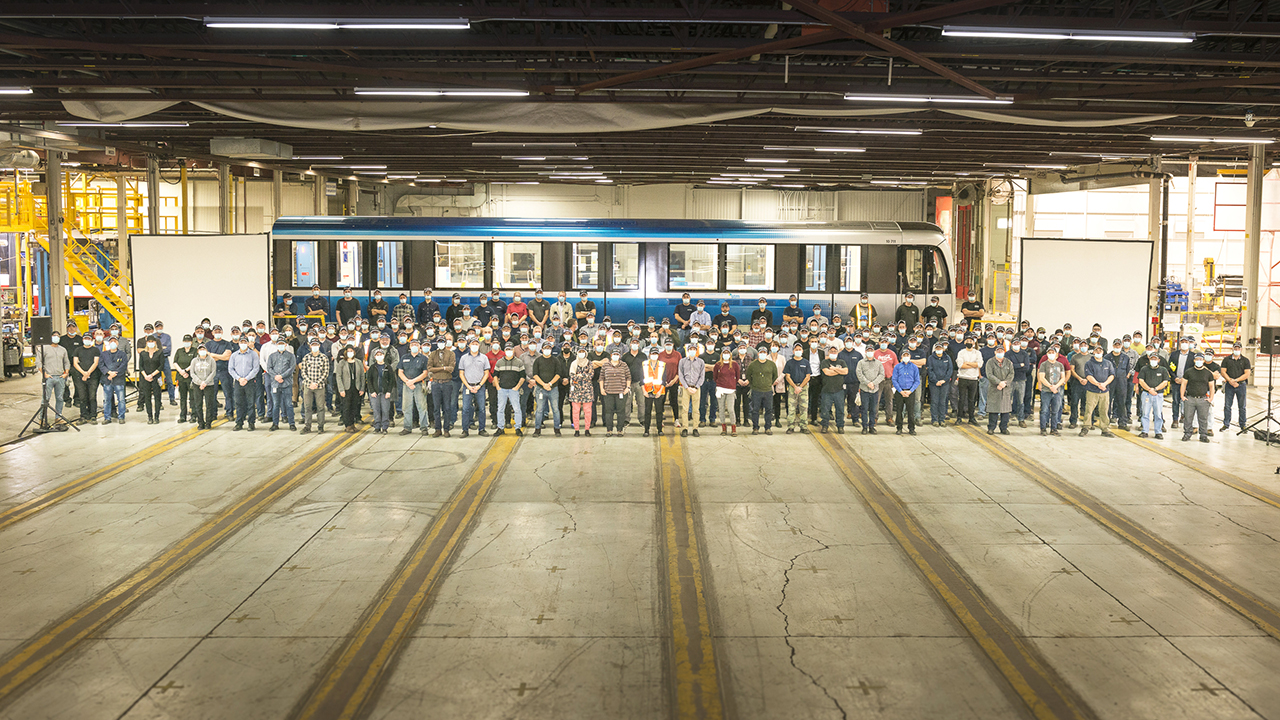
Nov. 23, 2021:Alstom team members in La Pocatière, Quebec, celebrate the completion of the 639th and final AZUR (MPM-10) car and prepare it for delivery to Montreal to serve STM transit users. Alstom/A@Z Multimédias
Alstom recently completed delivery on a major rapid transit railcar order for Société de Transport de Montréal (STM), which, like RATP in Paris and Sistema de Transporte Colectivo (STC) in Mexico City, uses rubber-tired vehicles. The 639 MPM-10 cars, configured in 71 carsets of nine and named “AZUR” (“Sky Blue”) by the public in 2012, were ordered from Bombardier and completed by Alstom. They entered service in 2016 and completely replaced the original MR-63 model. They feature an open gangway design similar to the Toronto Transit Commission’s Rocket cars, also built by Bombardier.
One unusual feature of the MPM-10 is its wooden brake shoes, used in conjunction with electromagnetic brakes. The shoes, or “blocks,” are made of yellow birch injected with peanut oil. Two sets are applied against the treads of the vehicle’ inboard steel wheels for friction braking. Hard braking produces a characteristic burnt popcorn scent. “A good braking system makes it possible to avoid premature wheel wear and achieve squeak-free braking,” Alstom explained to Railway Age. “Wood can meet these requirements. Unlike a composite shoe, a wooden shoe does not produce wheel wear. Peanut oil best tolerates the high temperatures observed during braking. This is the reason why a smell of wood and peanuts occurs when a train has to stop suddenly.”
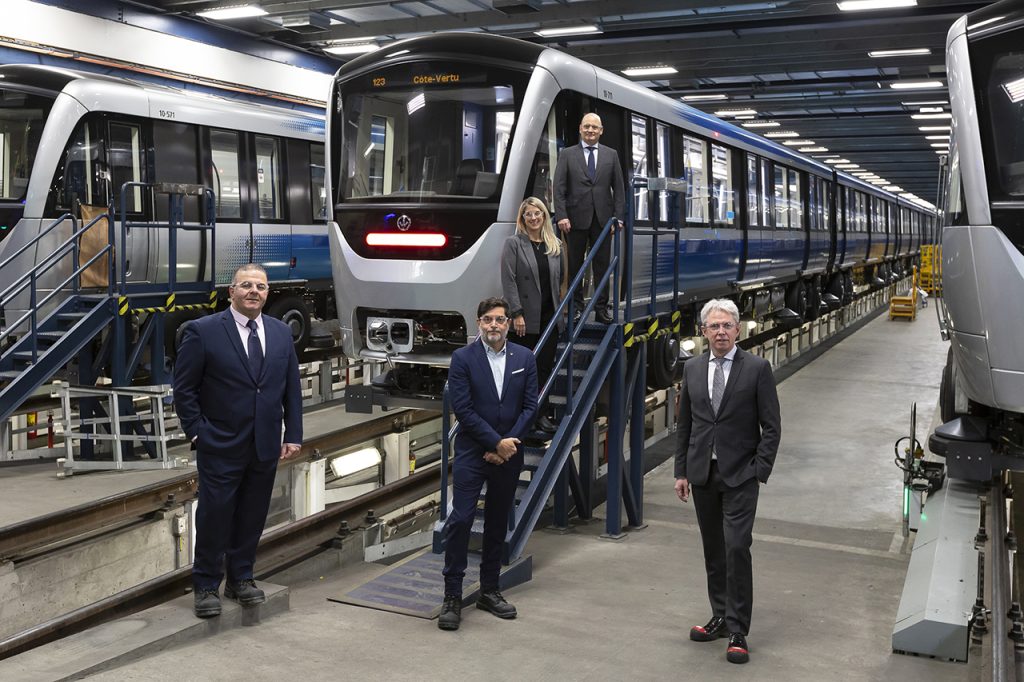
Railway Age spoke with Alstom Americas President Michael Keroullé about completion of the STM order and Alstom’s integration of Bombardier.

RA: The MPM-10 cars represent a major achievement for Alstom?
Michael Keroullé: It’s a program that’s very meaningful for us, because it was actually cooperative from the start between Alstom (40%) and Bombardier (60%), a consortium. It stayed as a cooperation between Alstom and Bombardier until we put these two companies together. So, it’s more than 10 years of good cooperation, one having some very specific technological features around rubber-tired metros. The strengths of Bombardier, being the local party, helped Alstom take a position here in Quebec. We built a factory for the program in Sorel-Tracy. Alstom produced the bogie, which was really a development of the Paris Metro. Bombardier did final car assembly in La Pocatière, which is the factory that’s close to Quebec. The feedback from the customer here in Montreal has been very positive. They’re happy with the comfort level in the cars. They’ve also added some environmentally friendly technologies, like wooden the brake shoes. It’s really a beautiful train. The open gangway gives a feeling of freedom of movement, and riders can find space. There’s a large gangway where you can walk freely.
RA: The La Pocatière plant has been around for a very long time.
Michael Keroullé: Yes. It’s a very old factory that was built, I think, in the early 1900s. It’s more than 100 years old. This was the biggest plant from Bombardier, and we are modernizing it now. We launched a significant automation program, to bring it up to speed and improve its competitiveness in the market. So, we are basically in the process now of rejuvenating this factory, and we see that as a good base for several types of production. Currently, we’re doing carbody shells for New Jersey Transit there. Going forward, we see this factory as a pivotal plant for us, a footprint for us, in the region. Obviously, with Buy America, we have fewer opportunities to use factories in Quebec to supply the U.S. market. But, there is a lot of potential for the Canadian market, where we can leverage this plant.
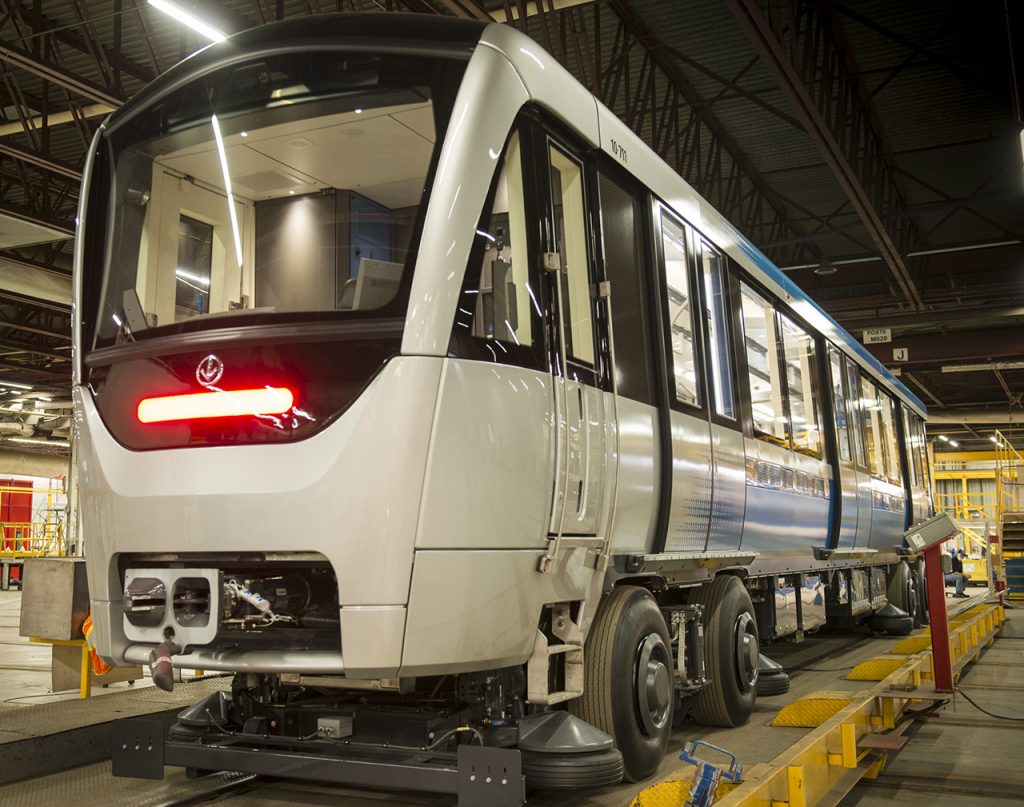
RA: Alstom has several facilities in Ontario Province.
Michael Keroullé: Currently, we have three plants, Thunder Bay, Brampton and Kingston. Kingston is where we have our test track, where we’re building LRVs. At Brampton, we’re building LRVs for programs in Ontario. At the moment, all these factories are pretty busy. Thunder Bay is where we’re doing LRVs for Toronto and bilevel overhauls for GO Transit.
RA: Ontario is such a huge market for transit with all the lines that are either under construction or planned—Eglinton Crosstown, Hurontario, replacing the Scarborough Rapid Transit with an extension of the TTC subway, the proposed TTC Ontario Line.
Michael Keroullé: There’s a lot of potential and a lot of work for us. Ontario is an important territory for us. It’s a very important province for us industrially, and also in terms of our customer base. Metrolinx is one of our biggest customers, very important. And Quebec still has a number of important projects. We are in the process of transferring production from Sorel-Tracy to La Pocatière, now that the MPM-10 program is done. Some of the employees are transferring, so it’s a good move with a lot of momentum, in terms of leveraging the strength of this new company, specifically for the region, and building on it. We’re recruiting quite heavily. We have around 500 positions open currently, with more to come. It’s going to get us to the right level of expertise for when the big investments in the U.S., Ontario and Quebec come in a few years. Our industry is a heavy industry. You need time to prepare, to ramp up. We’re doing all of that while also working on a significant backlog. It’s bittersweet to see a program like STM’s finishing, but that’s part of life in our industry. You take the program, you finish it, you’re happy when the customer is happy, and then you move forward to the next one.
RA: Those 500 open positions: What’s your outlook, as far as filling them? You’re obviously looking for skilled people, or people that you can train in certain skills. There are a lot of different crafts involved.
Michael Keroullé: We are really looking at it in various ways. Vocational training, for example. We actually created welding schools, both in Canada and in the U.S., to be able to attract and train and develop the right skillset in welding. Our carbody shells are welded, so we have to be good at that. We’re hiring software engineers, but there is a bit of an industry issue, in terms of competition with other software sectors. Currently, the IT industry is growing very fast, and companies are tapping into any software skillset they can find. Our industry has suffered from other IT sectors poaching our good software engineers—more than we have, actually, been able to attract. So, we’re trying to change that and make that sector more attractive for IT. And, trying to promote the good impact that we have to the world.
RA: Vehicles today are microprocessor-oriented, with a lot of software on board. Are you having any issues with obtaining microchips, microprocessors, like the automotive industry?
Michael Keroullé: We are. That’s a very big challenge at the moment. Microchips, as you said, are everywhere now on our trains, and they’re very difficult to source at the moment. This is affecting a number of programs. We’re trying to mitigate that. We’re in daily conversations with the microchip and card suppliers to mitigate any impact. That’s, unfortunately, something that will take a few months to resolve.
RA: The Infrastructure Investment and Jobs Act has produced a significant uptick in available transit funding. What does that mean for the market, for Alstom, in the U.S.?
Michael Keroullé: We know that allocation is still ongoing, how these funds will be made available to the agencies. We’re talking about $100 billion that’s going to go to rail and transit. It’s a great development for the industry, absolutely needed to be able to plan long-term. We think it will give agencies the ability to plan, which was really missing in the past. Having spoken with Amtrak and several agencies, that’s really how they look at that now. They will be able to put up their plans and a line of financing in front of that, which gives more certainty on how much can be invested, and when. Our industry has always suffered from a lack of planning, not because customers didn’t want to, but because they couldn’t. I’m optimistic about our ability to start conversations with customers on how we can operate better together. We are able to, basically, plan our own investments, in terms of resources and capacity, to be able to offer solutions that are going to meet customer needs. Everything is going to align better. When you look at all the money that’s going to flow in the next five years, we will have to build up the capacity of our industry and its supply chain. It’s extremely important.
RA: Do you see the nature of contracts changing a bit from a base contract with options, depending upon funding availability? With a more certain, longer-term funding stream, maybe you’ll see the agencies, if they’re able to plan for their needs for five to 10 years out, say, “Okay, instead of ordering X number of cars and then having options for X number going forward, let’s order a larger chunk.” Do you see that happening?
Michael Keroullé: Not at the moment. I hope we will get there. There’s going to be competition for supply, and more demand than supply capacity. So, options are still a good way to balance things. What’s really needed now is a proper coordination between agencies and the supply chain to really understand how we grow. The supply chain in the U.S., specifically, when you think about Buy America, is not yet up to the challenge to supply all of the needs that are going to come in the next 10 years. This needs investment, and investment needs visibility. And so, it all comes down to, “How are we going to develop our suppliers, so that we can provide what our customers need?” I’m very optimistic about that piece.
RA: Regardless of who you are or what industry you’re in, I think we all need a good dose of optimism after the struggles of the past couple of years, dealing with this awful pandemic.
Michael Keroullé: In conversations with many agencies, I find them to be very open to new ways of operating and thinking, because they’ve been constrained in the past, and they passed this constraint to the industry, to a certain extent. It’s really a matter of how we reinvent the way to operate, aligning needs with capacity.
